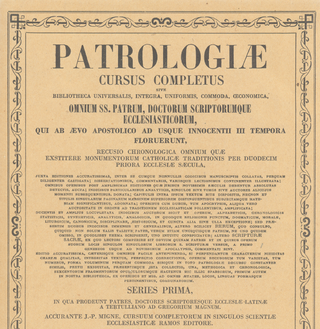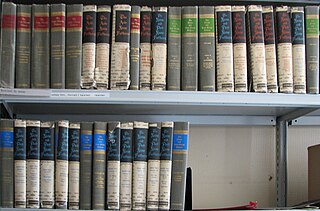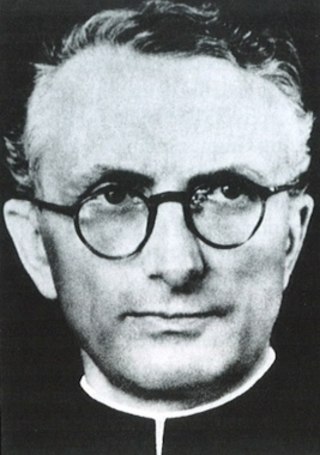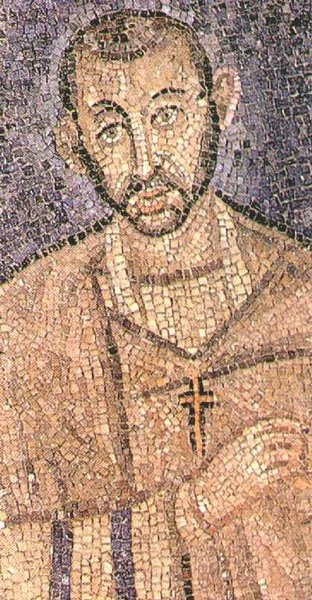
The Patrologia Latina is an enormous collection of the writings of the Church Fathers and other ecclesiastical writers published by Jacques-Paul Migne between 1841 and 1855, with indices published between 1862 and 1865. It is also known as the Latin series as it formed one half of Migne's Patrologiae Cursus Completus, the other part being the Patrologia Graeco-Latina of patristic and medieval Greek works with their medieval Latin translations.

Sedulius was a Christian poet of the first half of the 5th century.

Patristics or patrology is the study of the early Christian writers who are designated Church Fathers. The names derive from the combined forms of Latin pater and Greek patḗr (father). The period is generally considered to run from the end of New Testament times or end of the Apostolic Age to either AD 451 or to the Second Council of Nicaea in 787.
Isidor Hilberg, was an Austrian classical scholar.
The Corpus Christianorum (CC) is a major publishing undertaking of the Belgian publisher Brepols Publishers devoted to patristic and medieval Latin texts.
The Codex Hermogenianus is the title of a collection of constitutions of the Roman emperors of the first tetrarchy, mostly from the years 293–94. Most of the work is now lost. The work became a standard reference in late antiquity, until it was superseded by the Breviary of Alaric and the Codex Justinianeus.
Andrea Gallandi was an Italian Oratorian and patristic scholar.
Aurelianus was Archbishop of Arles from 546 to 551. His predecessors were Auxanius and Caesarius of Arles. His father Sacerdos was an Archbishop of Lyon. His cousin Nicetius succeeded his father as Archbishop of Lyon. He died on 16 June 551 in Lyon and is buried in the Church of Saint-Nizier. The text of his epitaph is preserved.

The Austrian Academy of Sciences is a legal entity under the special protection of the Republic of Austria. According to the statutes of the Academy its mission is to promote the sciences and humanities in every respect and in every field, particularly in fundamental research.

Rev.Otto Faller SJ was Provincial Superior of the Jesuit order in Germany, educator, teacher and Dean at Stella Matutina in Feldkirch, Austria and Kolleg St. Blasien in Germany, professor of patristic studies at the Gregorian University. He was lifelong editor of the works of St. Ambrose. At the request of Pope Pius XII, he contributed to the preparation of the dogma of the assumption of Mary and organized new Papal charity and Papal refugee offices during World War II.

Alois Grimm was a Jesuit priest, Patristic scholar, educator, and victim of Nazi religious hostility.
Edmund Hauler was an Austrian classical philologist born in Ofen to a Danube Swabian German family. His father, Johann Hauler (1829–1888) was also a classical philologist.
Aurelius Hermogenianus, or Hermogenian, was an eminent Roman jurist and public servant of the age of Diocletian and his fellow tetrarchs.
Karl Wilhelm August Reifferscheid was a German archaeologist and classical philologist.

Wilhelm August Ritter von Hartel was an Austrian philologist specializing in classical studies.

De bono mortis is a sermon by St. Ambrose (340–397), a Doctor of the Church. The text, which argues that death is not a bad thing to be feared, was written between 387 and 391. A companion piece or supplement to his De Iacob, it was composed "as two sermons, perhaps for the catechumens awaiting baptism at Easter". Profoundly informed by neoplatonism, it is one of the texts through which Augustine of Hippo, Ambrose's pupil in Milan, came under the influence of that philosophy.
Karl Schenkl was an Austrian classical philologist.
Heinrich Schenkl was an Austrian classical philologist. He was the son of classical philologist Karl Schenkl.

Karl Friedrich Wilhelm Zangemeister was a German librarian and philologist.
Fortunatianus of Aquileia was the bishop of Aquileia in the mid-fourth century A.D.







